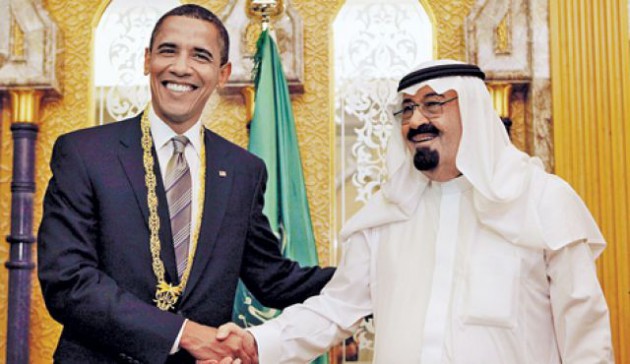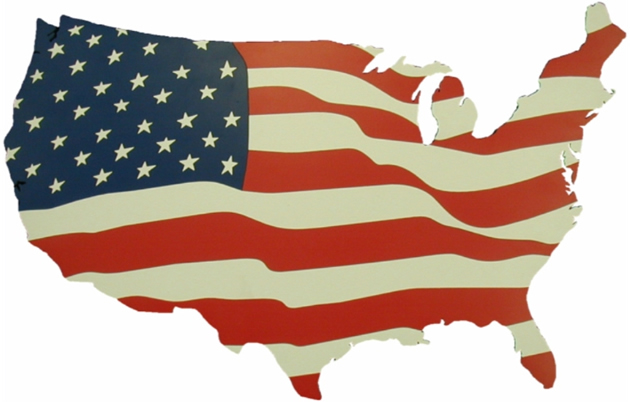Western hypocrisy on Saudi Arabia shocking

 Finian Cunningham Correspondent
Finian Cunningham Correspondent
The fawning by the American and British governments toward Saudi Arabia over the death of King Abdullah is for good – albeit unspoken – reasons. The oil-rich feudal kingdom is a lynch-pin of Western hegemony in the strategically vital Middle East region.
At a time when the region is gripped by instability more than ever, the House of Saud now enters a dangerous period of transition, which presents deep alarm to the Western patrons.
Britain’s own “crown prince” Charles flew to Saudi Arabia this weekend along with Premier David Cameron to pay tributes on the passing away of Abdullah (90) last Thursday. Flags above Buckingham Palace, 10 Downing Street and Westminster Abbey were flown at half-mast as a sign of respect.
US Vice President Joe Biden represented Barack Obama at the funeral proceedings. Obama hailed the late king and the US-Saudi relationship as a “force for stability and security in the Middle East.” American and British human rights campaigners criticised their governments for hypocritically extolling Saudi Arabia.
Just last week a Saudi journalist was being flogged with 1,000 lashes for his criticism of the ruling system, adding to a legion of other human rights violations in the secretive kingdom, including the mass imprisonment of thousands of political prisoners and the denial of women’s basic rights, as well as a vicious crackdown on a pro-democracy movement in the Eastern Province.
This apparent double-think by Western governments is of course nothing new. Ever since US President Franklin D Roosevelt signed a strategic pact with the founding monarch of Saudi Arabia, King Abdulaziz Ibn Saud in 1945, the kingdom was given an ironclad commitment of American military protection – and freedom to practice its feudal system regardless of human rights or democratic demands within the kingdom.
America set up a “tyranny in perpetuity.”
In return Saudi Arabia – possessor of a fifth of the world’s known oil reserves – would serve as the oil supplier to America and more importantly ensure that global oil trade would be conducted in US dollars, thus giving the petrodollar the pre-eminent place as the world’s reserve currency.
That arrangement continues to underpin American financial hegemony even though US economic demise has meant that the dollar has long outlived its role as a viable international standard of global exchange currency.
The bankrupt dollar system is sustained by the Saudi “special relationship.” No wonder Washington is falling over itself with condolences.
Another quid pro quo for American and British patronage of the Saudi monarchy is that it would use its gargantuan oil revenues to buy endless military weapons from these two Western states.
Saudi Arabia and its related Persian Gulf oil monarchies are the world’s biggest weapons importers, which is vital to shoring up the American and British military-industrial complexes that have become central to their bankrupt capitalist economies.
Saudi Arabia, along with Israel, is also a key proxy military force for Washington and London in their pursuit of covert regime-change objectives in the Middle East, for example in Syria, as well as fomenting instability against Iran.
So, naturally from the viewpoint of American and British governments, the fawning toward Saudi Arabia over the death of its king is not at all incongruous.
It is very much part of the “special relationship” of indulging a tyrannical despotic regime for their strategic interests – interests which do not include human rights or democracy.
Indeed, interests that rely on the suppression of human rights and democracy, which the House of Saud has dutifully obliged, as can be clearly seen in the way Saudi forces moved swiftly in 2011 to crush the pro-democracy movement in Bahrain.
But what gives the latest outpouring of American and British sycophancy urgency is the imperative need to secure the shaky realm within the Saudi kingdom.
The trouble with a backward absolute monarchy in which the state is run like a family business is that secretive succession of power is prone to explosive petty rivalries.
With no constitution or democratic system of governance, the House of Saud is vulnerable to power grabs based on perceived rightful lineage among hundreds of potential suitors. One of the many contradictions of the feudal kingdom is the practice of polygamy (multiple marriages) by the House of Saud. Ibn Saud, the founder of the state in 1933, is reckoned to have had 22 wives and more than 36 sons. They in turn have had sons – and all can claim some right to hereditary power.
The late King Abdullah, who took over in 2005, is believed to have had 24 wives and at least four sons.
Three of them, Princes Mutaib, Turki and Mishaal, hold positions of considerable power. Abdullah’s successor is his half-brother Salman.
At age 79 and in ailing health the new king’s days for ruling are already numbered. The next in line is 69-year-old Muqrin, another half-brother, who has been made Crown Prince. However, Muqrin, whose mother is from a Yemeni family, is not considered by some members of the House of Saud as having the “right pedigree.” Ibn Saud, who died in 1953, has three other surviving sons apart from Salman and Muqrin, and each of them has claims to the throne, as do their offspring.
Then there are the sons of the recently deceased Crown Princes Sultan (2011) and Nayef (2012). The latter’s progeny Muhammed bin Nayef has been made deputy Crown Prince and is in control of the powerful interior ministry. He is also said to have strong support from Washington and London.
Whereas Sultan’s son Prince Bandar bin Sultan, the notorious former spy chief, has since been pushed out of favour, partly owing to his disastrous terror meddling in Syria and partly owing to the death of his father and therefore loss of the crown prince link.
The practice of polygamy is the way for the House of Saud to use marriage ties and bloodlines as a means to cement relations across the tribal factions in the kingdom.
While that arcane method of power control may have worked in the past to consolidate Saudi Arabia as it emerged from a lawless desert nomadic entity into an stupendously oil-rich unitary state, the problem is that the custom creates an endless array of potential heirs to the throne.
As time goes on, and the hereditary lines become more complicated and entwined, the clash of perceived heirs to power will become all the more sharp.
For now, the new Saudi monarch, King Salman, is emphasising continuity and coherence, as are Washington and London – evidenced by their obsequious rush to the Saudi court this weekend.
But Western pandering to a backward despotic regime is a sign of its deepest fear – that continuity and stability within Saudi Arabia is far from certain.
The Saudi House of Cards has a lot of wild cards in play in regard to its power structure.
And, uncomfortably for the West, this comes at a time when conflicts across the Middle East — due in large part to Western-backed Saudi machinations — are on the boil.









Comments